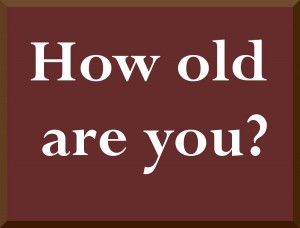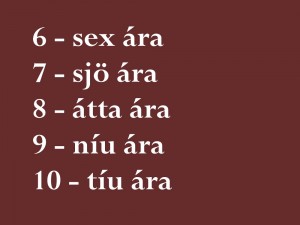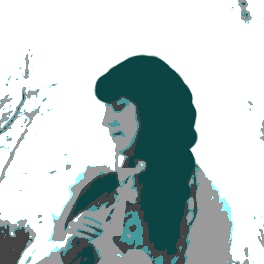Not just a number. Posted by hulda on Mar 31, 2014 in Icelandic grammar
 Explaining one’s age or the length of time that’s not measured with a clock (weeks, months, years etc.) in Icelandic is a mildly complex sport. My best advice for a student would be to just learn the example sentences by heart and use them until they come automatically; it takes some time but it’s far more efficient than trying to understand why things work the way they do first or to come up with some kind of a rule, Icelandic simply works the way it does. I’ll split this topic in two parts so that it’s easier to digest, so let’s start with some confusing word orders and new sets of numbers today!
Explaining one’s age or the length of time that’s not measured with a clock (weeks, months, years etc.) in Icelandic is a mildly complex sport. My best advice for a student would be to just learn the example sentences by heart and use them until they come automatically; it takes some time but it’s far more efficient than trying to understand why things work the way they do first or to come up with some kind of a rule, Icelandic simply works the way it does. I’ll split this topic in two parts so that it’s easier to digest, so let’s start with some confusing word orders and new sets of numbers today!
How old are you?
Or as it’s said in Icelandic, “Hvað ertu gamall/gömul?” (= lit. transl. What are you old?)(You’ll have to choose the declension form of the adjective depending on the person’s gender that you’re asking, gamall is for men, gömul for women) Icelandic way of asking basic questions differs often from the English one in a confusing way, there is f.ex. no way of asking someone’s age using the word “how”, because the Icelandic “hvernig” only translates to “what kind/which manner of”.
There’s also the third declension form, gamalt, which you use if you f.ex. ask about the age of a child or any other object that’s a neuter: “Hvað er barnið þitt gamalt?” (= How old is your child?) Always keep in mind that in Icelandic the real gender of the object does not necessarily matter, and that the declension depends only on the word itself – therefore hundur (= dog) always gets masculine declension regardless of the sex of the dog, and same goes for hestur (= horse) and köttur (= cat). “Hvað eru hundarnir þinir gamlir?” “Hinn er þriggja ára gamall en tíkin er tveggja ára gömul.” (= How old are your dogs? This one’s three years old but the female is two.*)
One’s year’s, two’s year’s… what the…?
Another problem for a language learner is that the numbers 1-4 get declension forms, and if your age ends with one of them you’ll have to use eignarfall (= genitive) form. Example:

“Hvað er hún Hulda gömul?” “Hún er þrjátíu og fjögurra ára gömul.” (= “How old is Hulda?” “She’s 34 years old.”) The feminine pronoun is not completely necessary but it adds stress to the topic. If you haven’t been discussing Hulda before but apropos of nothing want to know her age, the extra pronoun makes the question sound more natural and friendly: “About that Hulda, how old is she?”
However, in just about a week I’ll be 35, at which part I no longer need the genitive – I’ll simply be þrjátíu og fimm. Or, if I feel self-conscious about my exact age, þrítug (= female in her thirties, masc. form is þrítugur). So the upside to my expected 35th year crisis is that at least I’m looking at five years of ease in telling my age! 😀
Planning to stay long?
Another, different way of telling the time in years is if someone asks you f.ex. how long you’ve been living at place X:
“Hvað ertu búin/n að vera lengi á Íslandi?” (= How long have you been in Iceland? – lit. transl. What are you finished being long in Iceland?) The question itself is another one with complicated structure, but just learn it by heart and you’ll be good.
If the number you use is or ends at 1-4 it will always be in þolfall (= accusative):
“Ég er búin að vera hér í þrjú og hálft ár. Vinurinn minn er búinn að vera hér í tvö ár og fjóra mánuði.“ (= I (feminine) have been here for three and a half years. My friend (gender somewhat unspecified, though the fact that the word is masculine hints more at men – it can technically speaking also be a female friend, but usually Icelanders prefer to use the word vinkona for female friends) has been here for two years and four months.) **
In the same vein you can ask about potential amount of time, just using another verb: “Hvað ætlardu að búa hér lengi?” (= How long are you planning to live here?) You can also use the same form regardless of the amount of time asked, for example the question “Hvað ertu búinn að biða hér lengi?” (= How long have you (masculine) been waiting here?) and it can be answered using the same formula as well: “Ég er búinn að biða hér í tvo tíma, helvítis fíflin ykkar!” (= I’ve waited here for two hours you damn idiots!)
A small pronunciation guide!
* Can also be used in a rude manner.
** I have already had to reply to this question in a somewhat serious situation once when the bus I was on got into an accident and the police interviewed us all one by one. The accident itself was not very dramatic, the bus driver was likely new and didn’t know of a certain speed bump that isn’t very well marked, so he drove over it without slowing down. No one was badly hurt although one person had to go have himself checked at the hospital, so the whole thing quickly turned into a rather amusing class-room-like game of “Are these your sunglasses?” “No, mine are brown. Is this your hat?” “Yes it is, thank you.”
Has Hjaltalín ever made a bad song? I certainly haven’t yet found it! The band has been in existence for almost ten years by now, I think, although their members have changed a lot on the way. I’ve actually seen the singer Högni Egilsson on stage once already, although he wasn’t there to perform with Hjaltalín, but at the theatre production of Englar alheimsins (= Angels of the Universe). The band has this dreamy, calm quality to their sound that’s almost impossible to describe in words so here you go, have a listen instead:
Crack In a Stone (link).
Myself (link).
Engill alheimsins (link). This is the song that you’ll hear at the end of the play Englar alheimsins. Scroll down for lyrics.

Build vocabulary, practice pronunciation, and more with Transparent Language Online. Available anytime, anywhere, on any device.
About the Author: hulda
Hi, I'm Hulda, originally Finnish but now living in the suburbs of Reykjavík. I'm here to help you in any way I can if you're considering learning Icelandic. Nice to meet you!







Comments:
Janet:
Sæl!
Ég heiti Janet, og ég ætla að fara Ísland í ágúst með moðir mín og sonur minn. Ég er fjörutíu og ein árs gömul, hún er sextíu og níu ára gömul, og hann er ellefu ára gamall.
Ég ætla að læra íslensku og ég lika blog þinn!
Takk fyrir,
Janet
PS – Corrections are welcome… I’ve been building my vocabulary, but I know my grammar is still very weak. This topic was particularly timely – I was just trying to learn how to say our ages. =-)
Oh, by the way, I also had another time-related question – how would you say “9 years ago” – would it be “níu árum síðan”?
I’ve love your blog – Thanks!
hulda:
@Janet Sæl Janet! I’m happy you’ve found the blog useful. 🙂
I’d sayyour Icelandic is quite good! Let’s see:
– að far til Íslands (it needs the preposition “til”, which in turn demands genitive form for Ísland)
– similarly, með in this context takes dative, so með móður minni og syni (mínum). You can actually leave the “mínum” out if you like!
– eins árs
Líka is an exceptional verb because it changes the declension of the subject to dative: mér líkar bloggið þitt.
For 9 years ago I’d indeed go for “fyrir níu árum síðan”, you’re correct. 😉
lamenawuer:
This is pure gold!
Lemme tell ya, I’ve been learning Icelandic and it is the little nuances that won’t let me sleep…. You’ve done a beautiful job explaining what doesn’t make any sense (at first) for a foreign learner (BTW my kudos to you for the og-við-með-hjá post!).
Má ég spyrja eitthvað?
Ég hef séð þetta: “Það kostar fjögur hundruð, fimtu og tvær evrur fyrir eina nótt”. Hverju er það skrifað með “fjögur” og “fimtu”? Ég hefði sagt “fjórar” og “fimmtíu”.
Fyrirgefðu fyrir illa Íslensku og takk fyrir 🙂
hulda:
@lamenawuer Thank you, I’m glad I could help! 🙂 Nuances are the bane of any language learner, but Icelandic has some of the most… random ones I’ve ever come across.
As for the question –
Það á að vera “fjögur” heldur en “fjórar” vegna þess að “hundrað” er hvorukynsorð. Það er rétt að skrifa fimmtíu; “fimtu” hljómar eins og sytting eða villa.
Leiðrétta setningin er þá “Það kostar fjögur hundruð fimmtíu og tvær evrur fyrir eina nótt”. 🙂
lamenawuer:
@hulda Hi!
Takk fyrir hjálpina! Það hefur hjálpað mikið mér 🙂 Ég hafði lítil beiðni, getur þú skrifað grein um annar föll á íslensku, þolfall og þágufall? Eins og greinin um eignarfall, hún var mjög góð!! (like with the endings broke down 🙂 :))
Takk fyrir!!